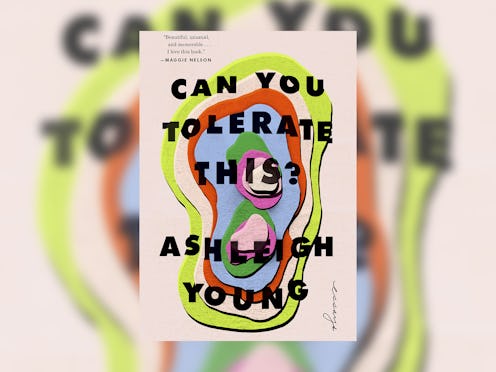Books
This New Book Is Helping Me Move Past My Own Body Insecurities

Have you ever picked up a book or a poem or a collection of essays and felt as though the author was writing about your life, your experiences, your feelings, or maybe even your deepest, darkest thoughts? She may be from a tiny town in New Zealand, but Can You Tolerate This? author Ashleigh Young has a style that will feel all too relatable to readers from all over the world who have felt the limitations of their body, or perhaps more accurately, the frustration, the uncertainty, and the self-doubt that comes with those limitations. In her short but vivid essay "On Breathing," Young writes about her uncomfortable relationship with the noisiness of her breath, and the way she captures the precise feelings of self-consciousness will make you think differently about your own insecurities.
"I have decided to begin breathing noisily again when I am puffed, rather than trying to conceal the breath," Young begins her short but striking essay. After years of fearing that heavy breathing was a sign of weakness, or a marker of being unfit, the author has decided to let her inhales and exhales be as loud and ragged as they need to be. But why did she ever try to edit such a natural process, one that anyone who has ever climbed a flight of stairs, carried a heavy load of groceries, or, like Young, ridden a bicycle uphill? The same reason so many of us shave our body hair, hide our stretch marks, and use makeup to hide acne and skin blemishes: we are all self-conscious about our bodies and how they perform in the world. For Young, it is her breathing — or rather, the volume and irregularity of it, especially in front of other people —that keeps her awake at night, wondering who heard and judged her for it.
"For years now I have tried to quiet my breathing, when puffed, by letting the breath out thinly, like a slow leak from a puncture, or even pretending that it was a sigh, as if I had just remembered an important task," Young writes. "One of my biggest fears, and one I thought about every day, was that an old boyfriend of mine, who I know goes to the university, would be passing in a bus and look and the window and see me there at the roadside, breathing noisily. 'She has got unfit,' he would think to himself."
It may seem like an irrational thing to embarrassed about, especially considering how many people have found themselves huffing and puffing during a workout or some other physically demanding task, but Young's uncomfortable relationship with her breathing is no more or less irrational than my own paranoia that someone will notice the unevenness of my breasts in a bathing suit, or my sister's fear that someone will notice how long her toes are in sandals. We all have parts of our bodies about which we are embarrassed and behaviors that we don't want others to see, but reading Young's visceral descriptions of her own insecurities helps puts them all in perspective.
"I am so puffed that it feels like my lungs have turned into a pair of excited dogs and they are jumping up and down, trying to feed on the air," Young describes her state of being after a long bike and difficult bike ride. "My lungs paw and salivate at the air, tearing bits out like stuffing." And yet, despite the natural reaction her body is having to her challenging workout, despite it's apparent need for big, gulping, audible breaths, the author tries to restrain herself, lest she be seen and judged by an onlooker.
Can You Tolerate This?: Essays by Ashleigh Young, $22, Amazon
It sometimes feels impossible to forget our insecurities, let alone get over them. For Young, not even a bike crash with an open car door could get the author to break out of her pattern of policing the volume of her breath or make her realize "there were more important things to worry about than my breathing." The self-conscious feelings we have about our bodies and what they do and don't do seem to be ingrained in us, interred in our very souls, but the truth is, they're a product of our relationship with world around us. They come from the experience of being judged or criticized by an individual, a group, and a culture that demands unattainable perfection.
Of course, breaking away from these thoughts and behaviors is much easier said than done. When we see someone else trying to change the way their body looks or how it performs in public, we're quick to recognize the attempt as unnecessary, irrational, or in the case of "On Breathing," maybe even a bit foolish. In our own lives, though, it's much harder to call our insecurities what they are, and even harder to move away from them. Sometimes, all it takes is time. Or at least, that was the case for Young and her fear of unattractive breathing.
"Today, nothing in particular happened to make me decide to breathe noisily again when I am puffed," Young writes in her essay. "So, just as I am not sure why I decided that I had to breath quietly, I am now not sure why I have decided that I don't have to." The point isn't necessarily the how, or even the why, but the fact that it was always Young's decision to make.
"Maybe it felt like enough time had passed and that I could breath now," she says at the end of her essay, reminding readers that maybe, someday, enough time will pass that we can all do the same.